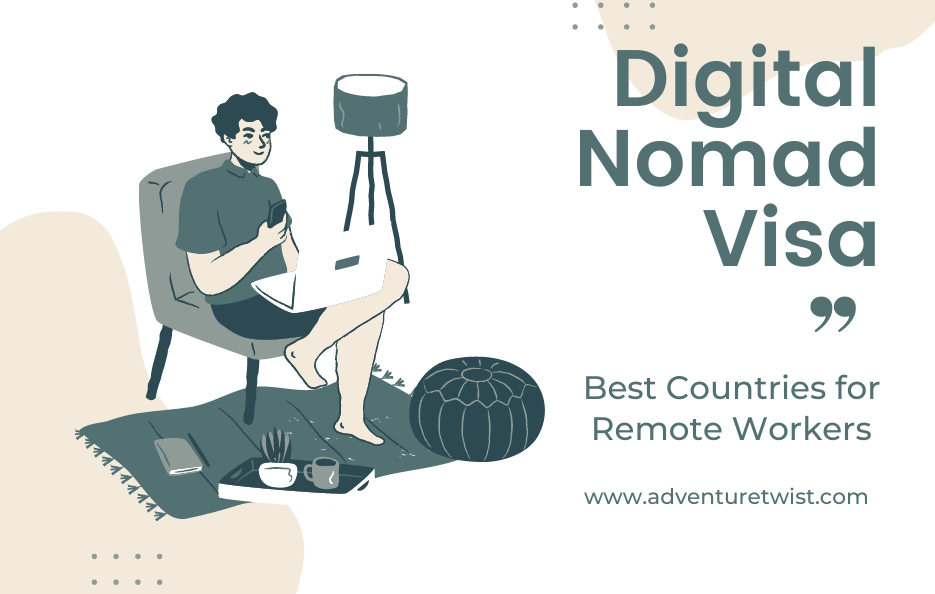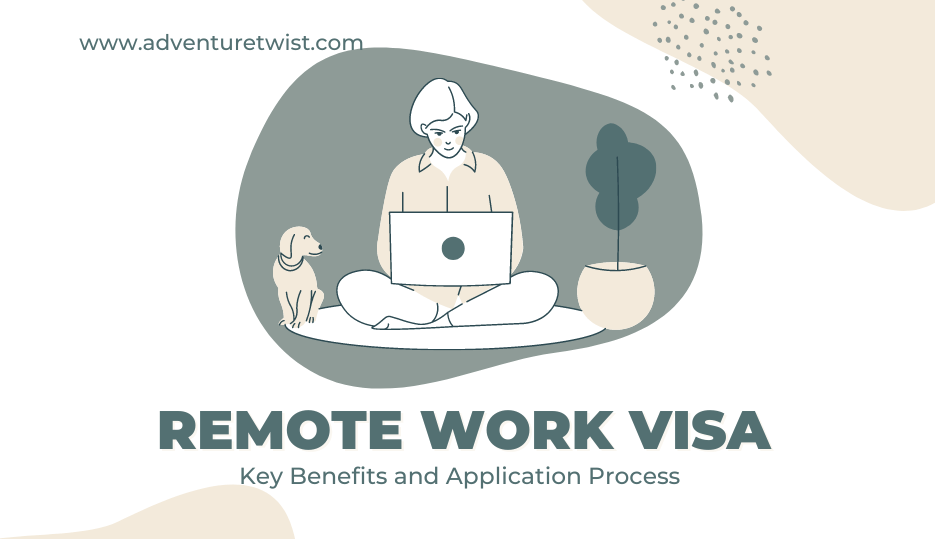
A digital nomad visa is a residence permit that allows remote workers to live in a foreign country for one to two years. It is the passport to a way of life where people live and travel, using technology gadgets and reliable internet connection to work remotely. This removes work from the traditional office to coffee shops, co-working spaces, and recreational centres, while traveling.
These are individuals who receive salaries from their home country or multiple sources while moving between countries and working remotely.
The popularity of the digital nomad lifestyles heightened following the Covid-19 pandemic. The lockdown and social distancing made people embrace working from home (WFH). The efficacy and cost-effectiveness further ingrained remote work into the work culture, making digital nomadism even more desirable.
To tap into the potential of this changing work pattern, a growing list of destination countries are trying to outdo one another by offering remote work visas. However, there is a minimum requirement an applicant must meet.
Basic Attributes of the Digital Nomad Visa
- Application Process: This involves providing basic personal information and sometimes a criminal background check.
- Duration: Although this permit stands the chance of being renewed, digital nomad visas often allow for an extended stay. This is unlike tourist visas which have a validity period of six months to two years.
- Income Requirements: Being able to show proof of a regular income source is critical to being granted remote work visas. This way, the host country gets convinced that the freelancer won’t be a liability to the state. The basic income requirement however varies from country to country.
- Health Insurance: Approval of digital nomad visas is predicated on the visitor having a comprehensive health insurance cover. Travel insurance which is ideal for quick travels comes recommended here as it prioritizes emergency coverage as the digital nomad may require.
As digital nomadism rises, many governments see it as an avenue to boost local economies without taking jobs meant for the local population. The tech opportunities provided by remote workers make smart governments around the world eager to issue such temporary residence permits. Remote work visas are driven by advancements in digitalization infrastructure which has since altered work cultures, creating the desire for greater work-life balance.
This explains why no fewer than 66 countries offer one digital nomad visa program or the other. New countries are joining every day in a bid to get the best brains abroad who will contribute to their overall economy.
In the face of this competition between countries to issue freelance visas, this article exposes you to the top destinations with the best deals for travelers looking for digital nomad visas. Starting from Europe, the following countries are the most attractive digital nomad destinations based on the unique benefits and appealing lifestyles they support.
Recommended: Kenyan eTA Requirements and Application Guide for 2024

Portugal’s Digital Nomad Visa: Key Benefits and Application Process
The Portuguese Digital Nomad Visa, frequently referred to as the D8 Visa, is for employees of foreign companies, freelancers, self-employed, and entrepreneurs who work remotely.
This visa scheme enables working remotely while enjoying the quality of life that annually attracts countless tourists to Portugal. It offers freelancers the country’s two-year residence permit, which is subject to extension. They must however reside in Portugal to retain their permits.
Key Benefits of Portugal’s Remote Work Visa
- Affordable Cost of Living: There is a comparatively cheaper cost of living when compared to other Western European countries. One-bedroom apartment in the city centre is rented for between 600 to 1000 monthly euros while groceries will take anywhere between 200 to 300 euros within the same timeframe.
- Quality of Life: With its stunning beaches, rich history, and vibrant culture, Portugal is a paradise for those seeking a balanced lifestyle that also offers affordable healthcare and legal protections.
- Community: Lisbon and Porto are some cosmopolitan cities in the country with bustling expat communities. This makes it easy for digital nomads to connect with like-minded individuals.
- Path to Permanent Residency and Citizenship: Digital nomads after residing legally in Portugal for five years can apply for a Permanent Residency Card. This requires continued residence, sufficient income, and a clean criminal record. As per citizenship, you would have to prove language proficiency and show ties to any of the Portuguese communities.
Greece Digital Nomad Visa
Greece boasts of an intersection between the Mediterranean lifestyle and modernity. Its digital nomad visa program is considered one of the best remote work permits due to the ease with which the visa can be obtained. Digital nomads, who stick to the requirements up till the expiration of the 12 periods, can apply for a Nomad Residence Permit that extends their visa for another year.
This freelance visa essentially allows non-EU/EEA/Swiss citizens to stay in Greece for up to a year during which time they can work from anywhere within the country.
They also get to enjoy stunning coastlines, ancient ruins, and idyllic islands. There are also numerous co-working spaces, cafes, beach resorts, and other work-friendly environments in major cities such as Athens and Thessaloniki.
Why Greece is a Top Digital Nomad Destination
- Ease of Approval: This is one of the easiest freelance visas to obtain with an application cost that is approximately €75.
- Tax incentives: Digital nomads who obtain the visa are exempt from paying income tax for the first seven years of their stay, provided they spend at least 183 days per year in the country.
- Developed telecommunications infrastructure: There’s the availability of high-speed internet and reliable mobile coverage available throughout the country. This enables access to a vibrant community of digital nomads.
- Family reunification: Having the Greece remote work visa allows digital nomads to come along with their spouses and dependents to Greece. That way they can spend quality time together as a family even as the primary visa holder works remotely.
Explore Estonia’s Digital Nomad Visa: Benefits and Requirements
If you have to work remotely while residing in Estonia, then you should sign up for the country’s beneficial digital nomad visa scheme. Apart from the applicant being required to have lived in the country for up to a year, there is the added requirement of providing proof of employment with a company registered outside of Estonia or proof of ownership of such a company.
A minimum monthly income of €3,504 (gross of tax) is equally a basic condition before the country can approve a digital nomad visa.
The holder of an Estonian digital nomad visa you will be able to: work remotely for different companies outside Estonia, visit other Schengen countries, and observe flexible working hours.
Benefits of Estonia’s Remote Work Visa
- E-Residency: This is an ease-of-doing business strategy by the Estonian government that allows digital nomads to establish and manage an EU-based company entirely online.
- Quality of Life: Estonia offers a high quality of life with a low cost of living compared to other EU countries. It boasts of picturesque old towns and beautiful natural landscapes that visitors can’t get enough of.
- Digital Infrastructure: Estonia is reputed for its advancements in digital infrastructure, which makes the country ideal for tech-savvy nomads.
- More remote working options in the country: This is made possible by the fact that Estonia has free access to the internet across the country with a speed of 103.48MBps.
Georgia’s Remote Work Visa: What Makes It Stand Out
Georgia offers its digital nomad visa program as “Remotely from Georgia”. Designed for freelancers, business owners, and remote workers, this digital nomad visa offers remote workers the opportunity to legally reside and work in the country for up to a year with official resident paperwork.
This can be obtained through an online application with a processing time of less than two weeks. It makes the Georgia digital nomad visa one of the easiest remote working visas to obtain globally.
Key Benefits of Georgia Remote Work Visa
- Liberal Visa Policy: The state runs a “Remotely from Georgia” program which invites highly paid citizens of foreign countries to work remotely in Georgia. This has increased the number of digital nomads who have visited the country resulting in the development of local nomad society.
- Low costs of living and low taxes: Digital nomads argue that Georgia is one of the cheapest countries for the representatives of their “profession” when compared to other European states or America. Georgia ranks seventh as per country with the lowest living costs. These costs include utility fees, groceries, transportation, and other basic needs.
- Variety of Space for Remote Work: All districts of Tbilisi have cafes, where freelancers can work with their laptops in a comfortable, and peaceful environment. The country parades common working spaces where users can find comfortable environments, conference/meeting rooms, developed infrastructure, and high-speed internet connection. There is Tech Park with branches in Zugdidi and Batumi.
- Amazing Nature and Travel Opportunities: In Georgia, you can work from the seaside resort, find freedom in the mountains, travel to local reserves, caves, monuments of cultural heritage, historic fortresses, churches and monasteries, forests, and lakes, and see the wonders of nature. Digital nomads can learn about Georgian culture and life from the national museums, galleries, art halls, and the Museum of Illusions.
Recommended: Complete Albania Visa Requirements: How to Apply
Leading Digital Nomad Visa Destinations outside Europe
Beyond Europe, these two countries are among other destinations with remote working opportunities (otherwise called workcation) where you can thrive as a digital nomad:
Dubai’s Virtual Working Scheme: A Guide for Digital Nomads
The holder of the United Arab Emirates’ digital nomad visa enjoys greater autonomy by not being bound to any particular company within the UAE. It also allows you to switch jobs or clients without dealing with complexities often associated with work visa transitions.
Foreign nationals can through this form of digital nomad visa live in Dubai without being employed by a company based in the Emirates.
The digital nomad who meets the eligibility requirement can fill and submit their application forms, pay the required fees, and await a confirmation email. The processing time for the visa can take up to 14 days. If approved, you will get a copy of your visa via email.
The following reasons make the UAE a top choice for digital nomads:
- Ease of doing Business: As a global business hub and tourism destination, Dubai offers several networking opportunities. Also, the government institutions are efficient with minimal bureaucracy, streamlining various processes for residents and businesses.
- Luxury Lifestyle: Dubai offers a luxurious lifestyle with high-end shopping and entertainment options. While there on a freelance visa, you can enjoy a fulfilling experience of dining at the top of the world’s tallest building, the Burj Khalifa.
- Zero Tax: Dubai offers a zero per cent tax rate, which is very attractive for personal and business finances.
- English is widely spoken: English, not just Arabic, is commonly used in business and everyday interactions, making it easy for expatriates to communicate. Similarly, there are many American and British schools there that provide high-quality education for children of expats.
- Safety: The United Arab Emirates is one of the safest countries in the world, with low crime rates and high security.
Recommended: How to Apply for the Nigeria Tourist Visa: A Comprehensive Guide
Germany’s Freelance Visa: An Alternative for Digital Nomads
The Freiberufler visa is the closest alternative to the digital nomad visa in Germany. It allows you to stay from three months up to three years with the possibility of an extension in Germany working remotely for German clients. The holder of the Germany Freelance Visa can also visit other Schengen countries.
Proof of sufficient funds to live comfortably of at least €9,000 per annum as well as having health insurance coverage are also eligibility criteria.
Key Benefits of the German Freelance Visa:
- Independence: Through this visa, you can be your boss in Germany, enjoying great flexibility as you work.
- Physical office is not necessary: Given the freedom to choose clients and projects to work on without adhering to stiff protocols, you may not need an office to make your work happen.
- No age requirement: The age of the applicant for this visa is immaterial, just as you are not required to produce any language proficiency test scores
- Path to permanent residency: A temporary residence permit can be converted to permanent residency. This can happen after three to five years. This visa also offers more scope for the candidates to bring their families to Germany.
Recommended: Top 10 immigration questions and answers for tourists and visitors
CONCLUSION
Digital nomad visas are a mainstream phenomenon that offers remote workers the chance to explore new cultures, environments, and lifestyles while maintaining a stable work-life balance.
There are over 35 million digital nomads worldwide who on an annual basis contribute USD787 billion to the global economy. In a bid to get a slice of this buoyant market, more countries including Japan are introducing the program, even as those already offering digital nomad visas strive to emerge as the best destination for remote workers.
Digital nomadism provides an immense opportunity for you to remain productive while traveling the world. Research has shown digital nomads tend to be high earners, with 36% of them earning between 100 and 250 thousand USD per year. Join the league of high earners by signing up for one of the top digital nomad visas applicable to you.



0 Comments